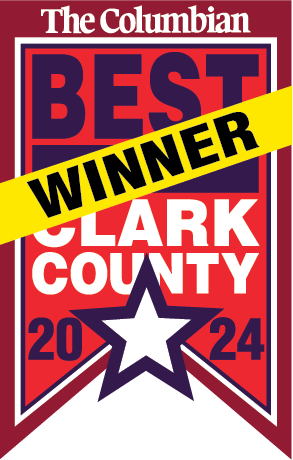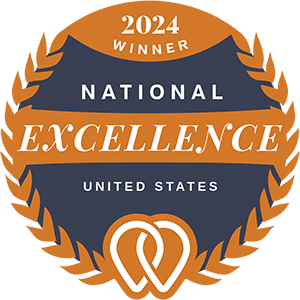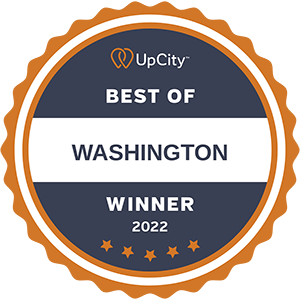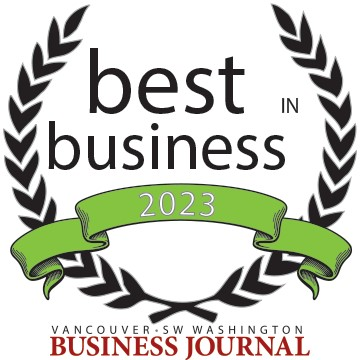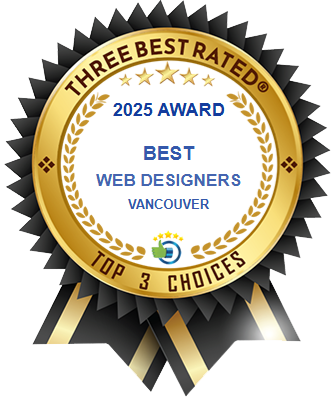Portland, Oregon
Why We Love Portland
Premium Websites calls Portland its home!
Being just across the Columbia River, Portland is also our home. It is a diverse city with an extensive tech industry background.
In the 1990s, the technology industry began to emerge in Portland, specifically with the establishment of companies such as Intel, which brought more than US$10 billion in investments in 1995 alone. After 2000, Portland experienced significant growth, with a population rise of over 90,000 between 2000 and 2014. The city’s increasing reputation for culture established it as a popular city for young people, and it was second only to Louisville, Kentucky, as one of the cities to attract and retain the highest number of college-educated people in the United States.
The city acquired a diverse range of nicknames throughout its history, though it is most often called “Rose City” or “The City of Roses”. Another widely used nickname by locals in everyday speech is “PDX,” the airport code for Portland International Airport. Other nicknames include Bridgetown, Stumptown, Rip City, P-Town, and Portlandia.
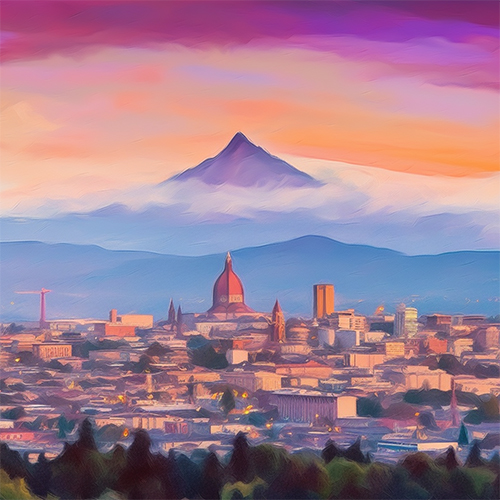
Places to Visit in Portland, Oregon
Portland Japanese Gardens
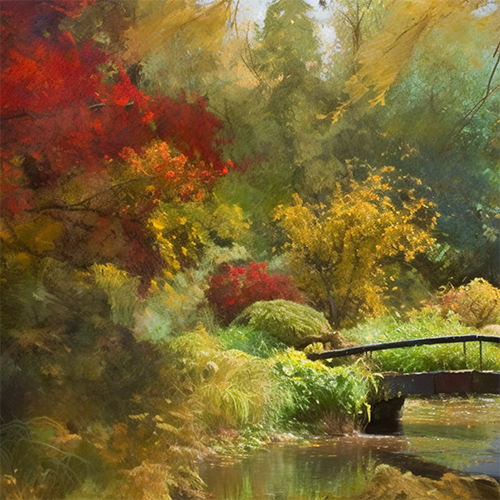
The Portland Japanese Garden is a traditional Japanese garden occupying 12 acres, located within Washington Park in the West Hills of Portland, Oregon, United States. It is operated as a private non-profit organization, which leased the site from the city in the early 1960s. Stephen D. Bloom has been the chief executive officer of the Portland Japanese Garden since 2005.
Oregon Museum of Science and Technology (OMSI)
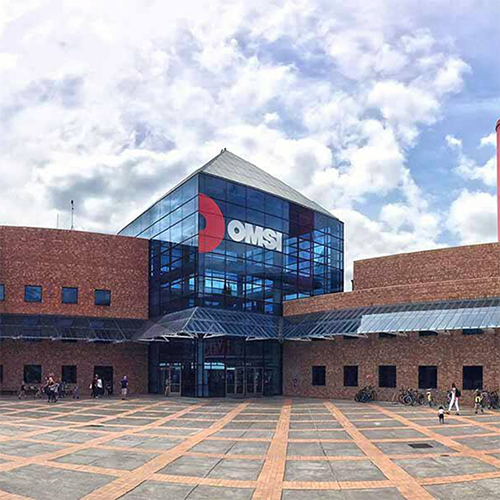
The Oregon Museum of Science and Industry is a science and technology museum in Portland, Oregon, United States. It contains three auditoriums, including a large-screen theatre, planetarium, and exhibition halls with various hands-on permanent exhibits focused on natural sciences, industry, and technology. Wikipedia
Portland Saturday Market
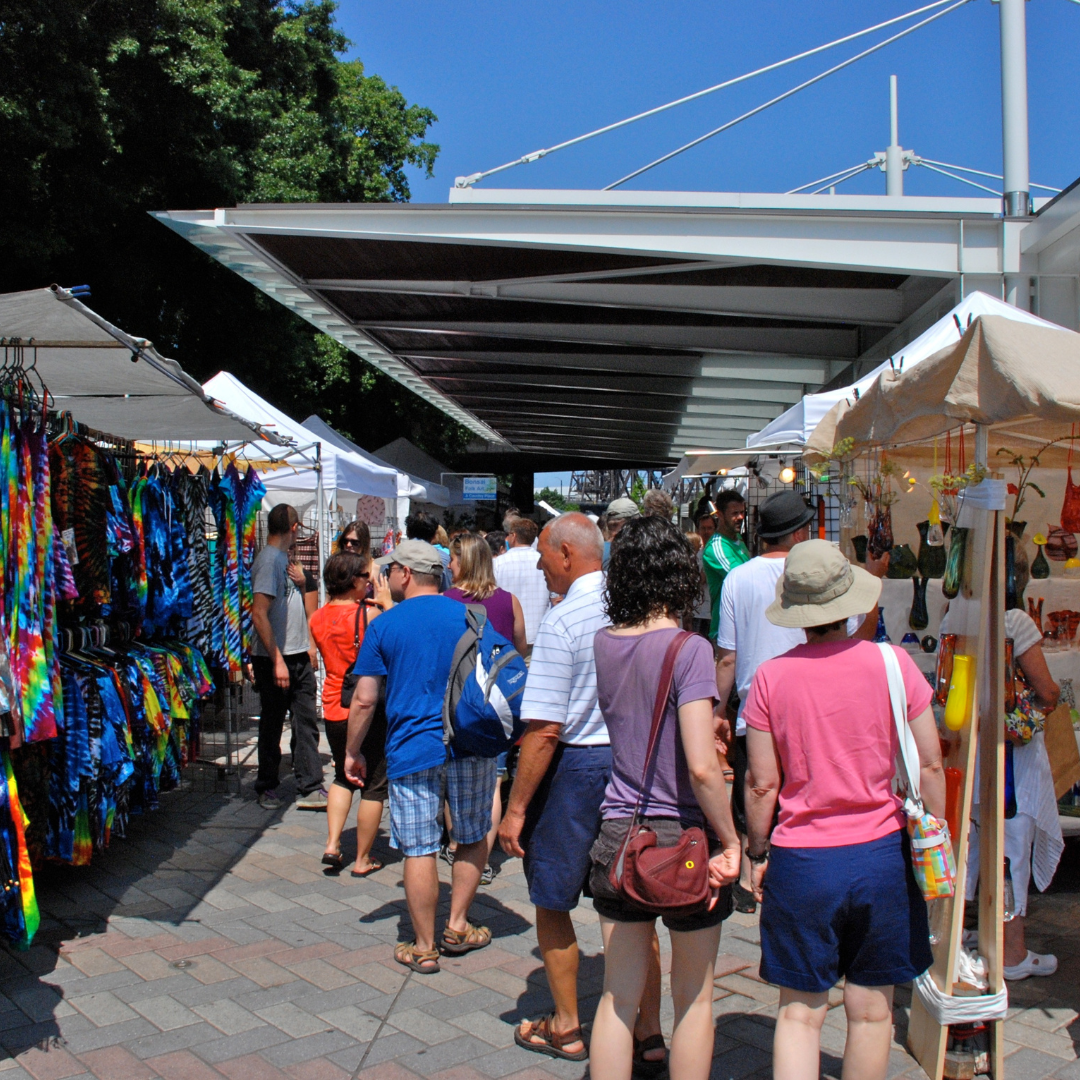
The Portland Saturday Market is an outdoor arts and crafts market in Portland, Oregon. It is the largest continuously operated outdoor market in the United States. Wikipedia
We enjoy the Portland Saturday Market on Sunday! Parking is free in downtown Portland until 1 PM on Sundays. All the vendors stay for both days every week, May – October.
Portland, Oregon Based Companies
- Nike
- Intel
- Columbia Sportswear
- Premium Websites, Inc.
- Daimler Truck North America
- Portland General Electric
- Adidas
- Tektronix
- Pendleton Woolen Mills
- FLIR Systems
- CD Baby
- Consumer Cellular
- Leatherman
- Made In Oregon
- Umpqua Bank
- Vanport Manufacturing
- Webtrends
- ZoomCare
Known for its vibrant food scene and inclusive culture, it grapples with significant challenges like rising crime rates and homelessness.
The effects on the commercial environment in Portland, Oregon, are undeniable.
In navigating these complexities in Portland, Oregon, service-based businesses must adapt to survive and thrive amidst changing demographics and socio-economic issues.
The Charm and Challenges of Portland, Oregon
Portland is celebrated for its rich craft beer culture and diverse cuisine. It’s an inclusive oasis made real through the culinary delights that cater to all palates. However, it also faces significant challenges, such as increasing homelessness and crime.
These issues have unfortunately tainted Portland’s reputation in recent years. The effects ripple from residents to local businesses, especially those offering services within the city limits.
Craft Beer: A Flourishing Industry
In North America alone, Portland stands tall with over 70 breweries – more than any other city worldwide. This thriving industry draws tourists who flock here solely for unique brews found at places like Deschutes Brewery or Rogue Ales Public House.
This bustling scene offers numerous opportunities for service-based enterprises catering not only to locals but also to visitors. From supplying ingredients to providing logistical support or even organizing brewery tours, this sector can stimulate business growth in downtown Portland in countless ways.
Diverse Cuisine: An Inclusive Oasis Made Tasty
Various cuisines define food scenes, stretching from gourmet donuts at Voodoo Donuts to authentic Thai dishes at Pok Pok restaurant. Food carts scattered across downtown offer affordable options, while upscale dining establishments present exquisite experiences – making it an inclusive gastronomic paradise for everyone.
Service-oriented businesses operating within this realm stand a chance to survive and thrive by introducing new flavors or innovative dining concepts into the marketplace, thereby enriching the cultural diversity of community life.
Understanding Declining Demographics
Rising crime rates across North America, including downtown Portland, may deter individuals and families from seeking safer living conditions.
Economic challenges such as the increasing cost of living could also play an integral role despite initiatives towards affordable housing solutions by local authorities like Multnomah County or City Council members.
The Impact on Service-Based Businesses
Understanding these demographic changes is crucial for local businesses as they need to adapt their services accordingly. For instance, if younger demographics leave mainly due to affordability issues while older populations remain stable or increase slightly, businesses might consider tailoring their offerings towards an older clientele.
On another note, despite declining numbers in specific demographics like young professionals or families with children, other groups, such as retirees, might see growth opportunities. Years ago, before all these shifts occurred, many had chosen to retire here, attracted by amenities ranging from craft beer breweries to cultural attractions, including the renowned Japanese Garden.
Lastly, but importantly, leveraging digital marketing tools like SEO (Search Engine Optimization) can prove invaluable when trying to connect effectively across diverse audiences regardless of shifting demographic landscapes.
In addition, some potential customers may choose not to travel into city streets, fearing possible confrontations with homeless people, thus affecting foot traffic, particularly near hotspots where unhoused individuals often gather.
Business owners must remain knowledgeable about population trends to stay ahead of the competition and manage in an ever-changing environment.
Future Projections for Service-Based Businesses in Portland
The future landscape of service-based businesses in Portland, Oregon, is a complex blend of challenges and opportunities. Current trends such as population shifts, escalating crime rates, and homelessness pose considerable obstacles. However, the city’s vibrant cultural scene and distinctive elements like the booming craft beer industry offer potential avenues for growth.
Adapting to Change: A Key Strategy
In any business environment, change is inevitable; how one responds determines success or failure. For service-based businesses operating within downtown Portland and around areas near landmarks like Portland Japanese Garden, proactive adaptation to these changes can make all the difference.
A clear understanding of demographic patterns helps tailor services effectively – be it marketing strategies or adjustments to product offerings when younger populations move into certain regions while older demographics leave.
Beyond adapting to changing customer bases, investment towards enhanced security measures could prove invaluable given rising crime rates – safeguarding assets while reassuring customers about their safety during patronage.
Leveraging Opportunities Amidst Challenges
Apart from overcoming adversity through effective response mechanisms, numerous untapped potentials are embedded within unique aspects characteristic of life in North America’s inclusive oasis made famous years ago – Portland.
- Craft Beer Industry: The flourishing craft beer sector presents an immense opportunity with over 70 breweries scattered across the metro area alone. Companies offering related services stand on fertile ground here.
- Tourism Drawn By Cultural Attractions: Tourist attractions such as renowned gardens draw visitors year-round who contribute significantly to the local economy, thus providing ample prospects for enterprises ranging from hospitality providers to transport services.
FAQs about Portland, Oregon
What is Portland, Oregon, known for?
Portland, Oregon, renowned as “The City of Roses,” is celebrated for its vibrant arts scene, pioneering sustainability initiatives, and stunning natural beauty. It’s a city where modern urban culture melds seamlessly with an unwavering commitment to preserving the environment. Here are some of the highlights that make Portland truly unique:
- Rich Cultural Tapestry: Portland’s arts scene is a dynamic blend of music, theater, and visual arts. With events like the Portland Jazz Festival and institutions like the Portland Art Museum, the city is a haven for creative minds and art enthusiasts alike.
- Foodie Paradise: Known for its culinary innovation, Portland boasts a diverse food scene characterized by farm-to-table restaurants, a myriad of food carts offering international cuisines, and a strong coffee culture that rivals the best in the world.
- Nature and Outdoor Activities: Encircled by rivers, forests, and mountains, Portland offers countless outdoor activities. From hiking in Forest Park, one of the country’s largest urban forests, to enjoying the beauty of the Japanese Garden, nature is always within reach.
- Sustainability and Green Living: Portland is a leader in sustainability, with extensive bike paths, green building initiatives, and policies supporting renewable energy and recycling. This commitment to the environment shapes the city’s lifestyle and urban policies.
- Craft Beer and Microbreweries: Portland is often called the craft beer capital of the world, with more breweries than any other city. This thriving craft beer scene reflects Portland’s love for quality, locally-produced beverages.
- Unique Neighborhoods: Each of Portland’s neighborhoods has its distinct flavor, from the historic charm of the Pearl District to the eclectic and vibrant Mississippi Avenue. Exploring these neighborhoods offers insights into the city’s diverse culture and community spirit.
- Festivals and Events: Portland’s calendar is packed with festivals and events that celebrate everything from the city’s famed rose gardens to its musical heritage and craft beer. The Portland Rose Festival and Oregon Brewers Festival are just some events that draw visitors from near and far.
Portland’s reputation as a forward-thinking and inclusive city, with its natural beauty and cultural richness, makes it a unique place to visit and live. Whether you’re drawn to the outdoors, the arts, or the culinary scene, Portland offers something special for everyone.
Why is Portland called Rip City?
Portland, Oregon, earned the nickname “Rip City” from a spontaneous and exuberant moment during a Portland Trail Blazers basketball game. The term was coined by the team’s play-by-play announcer, Bill Schonely, during a game against the Los Angeles Lakers on February 18, 1971. Trail Blazers guard Jim Barnett took an unexpected, long-range shot that miraculously went in that game. Schonely, caught up in the moment’s excitement, exclaimed, “Rip City! All right!” without premeditated thought. The phrase had no particular meaning or origin; it was simply an expression of excitement that Schonely blurted out.
Despite its spontaneous origins, the term “Rip City” quickly caught on with Trail Blazers fans and the Portland community. It has since become synonymous with the team and the city, embodying the spirit, enthusiasm, and community pride of Portland’s NBA team and its supporters. “Rip City” is now used on Trail Blazers merchandise, in promotional materials, and throughout the city to celebrate Portland’s unique identity and its beloved basketball team.
Should I move to Portland?
Deciding whether to move to Portland, Oregon, depends on your preferences, lifestyle, and priorities. Portland offers a unique blend of urban culture, natural beauty, and a strong sense of community, but like any city, it has pros and cons. Here are some factors to consider:
Pros of Moving to Portland
- Natural Beauty and Outdoor Recreation: Portland is surrounded by stunning natural landscapes, including mountains, rivers, and forests, offering ample opportunities for hiking, biking, skiing, and fishing.
- Environmental Consciousness: Known for its green initiatives, Portland is a great city for those who prioritize sustainability and eco-friendly living.
- Vibrant Food Scene: Portland’s focus on farm-to-table dining, food carts, and innovative cuisine will delight food lovers.
- Arts and Culture: The city boasts a thriving arts scene, with numerous galleries, theaters, music venues, and cultural institutions.
- Bike-Friendly: Portland is one of the most bike-friendly cities in the U.S., with an extensive network of bike lanes and paths.
- Craft Beer and Coffee: The city is famous for its craft beer breweries and high-quality coffee shops.
Cons of Moving to Portland
- Cost of Living: While cheaper than cities like San Francisco or New York, Portland’s cost of living has risen, particularly in housing prices and rent.
- Weather: Portland experiences many rainy days, especially during fall and winter, which might be a downside for those who prefer sunnier climates.
- Traffic and Public Transportation: The city has a good public transportation system, but traffic congestion can be a problem, especially during peak hours.
- Job Market: The job market can be competitive depending on your industry. It’s a good idea to secure employment before moving.
- Social Climate: Portland is known for its progressive values, which might not perfectly suit everyone’s political or social preferences.
Things to Consider
- Community and Lifestyle: Reflect on whether Portland’s community and lifestyle align with your values and interests.
- Economic Opportunities: Research the job market in your field to ensure you have viable opportunities.
- Housing: Investigate the housing market to find an area that suits your budget and preferences.
- Visit First: If possible, visit Portland before deciding to move. Spend time in different neighborhoods and try to experience the city as a local.
Ultimately, the decision to move to Portland should be based on carefully evaluating how well the city’s offerings align with your lifestyle, career, and community needs.
What are the benefits of living in Portland?
Living in Portland, Oregon, offers a variety of benefits that cater to a wide range of lifestyles and interests. Here are some of the key advantages of calling Portland home:
- Natural Beauty and Outdoor Access: Portland is surrounded by abundant natural beauty, including forests, rivers, and mountains. Residents enjoy easy access to outdoor activities like hiking, biking, kayaking, and skiing. The proximity to both the coast and the mountains provides diverse landscapes for weekend adventures.
- Strong Sense of Community: Portland is known for its friendly and welcoming atmosphere and strong sense of community. Neighborhoods often have unique identities and community events, fostering connections among residents.
- Sustainability and Eco-Friendliness: Portland is a leader in green living and sustainability. The city has extensive recycling and composting programs, numerous parks and green spaces, and policies encouraging sustainable urban development and transportation, such as biking and public transit.
- Vibrant Food Scene: The city boasts a dynamic food scene that emphasizes farm-to-table dining, a vast array of food carts offering global cuisines, and a strong focus on organic and locally sourced ingredients. Portland is also famous for its coffee culture and craft breweries.
- Arts and Culture: Portland has a thriving arts scene, including a vibrant music industry and numerous art galleries, theaters, and museums. The city hosts various cultural events and festivals annually, celebrating everything from film and music to craft beer and food.
- Bike-Friendly Infrastructure: Portland is one of the most bike-friendly cities in the United States, with an extensive network of bike lanes and trails. This infrastructure supports a healthy lifestyle and provides an alternative to car-based commuting.
- Innovative and Entrepreneurial Spirit: Portland is home to a dynamic mix of startups, tech companies, and creative businesses. The city’s culture of innovation and entrepreneurship makes it an attractive place for professionals looking to work in creative industries or start their own businesses.
- Quality of Life: Despite its growth, Portland maintains a balance between urban and natural spaces, contributing to a high quality of life. The city’s diverse neighborhoods offer a range of living experiences, from vibrant urban centers to quieter, tree-lined streets.
- Progressive Values: Portland is known for its progressive social and political climate, making it a welcoming place for diverse communities and individuals who value inclusivity and social justice.
- Cultural Diversity: While historically less diverse than some major US cities, Portland has become more culturally diverse, and there’s a growing emphasis on celebrating and supporting diverse communities and businesses.
While these benefits highlight the positive aspects of living in Portland, it’s essential to consider them alongside personal preferences, lifestyle, and the potential drawbacks, such as the cost of living and the weather, to make an informed decision about moving to or living in Portland.
What are some must-see attractions in Portland, Oregon?
Portland, Oregon, has various attractions catering to different interests, from lush parks and gardens to historic sites and vibrant marketplaces. Here are some must-see attractions in Portland:
- Portland Japanese Garden: Considered one of the most authentic Japanese gardens outside of Japan, this serene space offers beautiful landscapes, water features, and traditional tea ceremonies.
- International Rose Test Garden: Located in Washington Park, this garden showcases over 10,000 rose bushes of approximately 650 varieties. It’s a testament to why Portland is known as the “City of Roses.”
- Powell’s City of Books: An iconic bookstore that occupies a full city block, Powell’s is the world’s largest independent new and used bookstore, offering an immense selection of books across all genres.
- Oregon Museum of Science and Industry (OMSI): OMSI is one of the leading science centers in the United States. It offers interactive exhibits, a planetarium, and the USS Blueback submarine, which visitors can explore.
- Portland Art Museum: The oldest art museum in the Pacific Northwest, it boasts an impressive collection of Native American art, contemporary art, and special exhibitions.
- Lan Su Chinese Garden: A beautiful and meticulously arranged Chinese garden that offers a peaceful escape from the city, with traditional architecture, water features, and a tea house.
- The Grotto – National Sanctuary of Our Sorrowful Mother: A unique outdoor shrine and botanical garden with stunning sculptures, walking paths, and a meditation chapel set into the cliffside.
- Tom McCall Waterfront Park: This park runs along the Willamette River and is perfect for walking, biking, and enjoying the views. It’s also the site of many of Portland’s festivals and events.
- Alberta Arts District: This area exemplifies Portland’s creative spirit. It is known for its colorful murals, independent shops, galleries, and restaurants.
- Pittock Mansion: A historic house museum offering insights into Portland’s history and breathtaking views of the city and Mount Hood.
- Forest Park: One of the largest urban forests in the United States, Forest Park offers miles of hiking and biking trails amidst lush woodland.
- Portland Saturday Market: This outdoor arts and crafts market, which operates on weekends from March through December, is the largest continuously operating market in the United States. It showcases local artisans, food vendors, and musicians.
- Mount Tabor Park: An extinct volcanic cinder cone that provides panoramic city views and a tranquil setting for picnics, walking, and cycling.
These attractions offer a glimpse into Portland’s diverse experiences, from its natural beauty and historical significance to its thriving arts and cultural scene.
How can I get around Portland using public transportation?
Going around Portland, Oregon, using public transportation is convenient and user-friendly, thanks to a comprehensive network managed by TriMet, including buses, light rail (MAX), and streetcars. Here’s how you can navigate the city using these options:
1. MAX Light Rail
- Routes: The MAX Light Rail has five lines (Blue, Green, Red, Yellow, and Orange) connecting downtown Portland with the suburbs, Portland International Airport, and other key areas.
- Operation: Services run approximately every 15 minutes most of the day, with reduced frequency in the early mornings, late evenings, and weekends.
2. Portland Streetcar
- Routes: The Portland Streetcar operates on three lines: the NS Line (North-South), the A Loop, and the B Loop. It connects Nob Hill to PSU and makes a loop on both sides of the river to connect popular districts.
- Operation: Streetcars run every 15 minutes on weekdays and weekends, serving key areas like Downtown, the Pearl District, and the South Waterfront.
3. Buses
- Routes: TriMet’s bus service has numerous routes covering the entire Portland metro area, making it easy to get anywhere in the city and surrounding suburbs.
- Operation: Bus frequencies vary by route and time of day, with major lines running every 15 minutes on weekdays.
Planning Your Trip
- TriMet Website and Mobile App: Use TriMet’s official website or mobile app to plan your journey, view schedules, and get real-time updates on bus and train times.
- Hop Fastpass: A convenient payment method is the Hop Fastpass, an electronic fare card for buses, MAX light rail, and streetcars. You can also pay your fare with a contactless credit card or mobile wallet.
- Fares: Fares are based on duration (2.5 hours or 1 day) and provide unlimited rides on buses, MAX, and streetcars within the purchased time frame. Reduced fares are available for youths, seniors, and those with disabilities.
- Bike Friendly: Portland’s public transportation is bike-friendly, with bike racks available on the front of buses and designated spaces for bikes on MAX trains and streetcars, making it easy to combine cycling and public transit.
Tips for Using Public Transportation in Portland
- Check the Schedule: Always check the latest schedules and service alerts before starting your journey, especially on weekends and holidays when service frequencies might be reduced.
- Be Prepared: Before boarding, have your fare ready or your Hop Fastpass card loaded to ensure a smooth trip.
- Respect the Rules: Follow TriMet’s rules and guidelines, such as priority seating areas for seniors and riders with disabilities and bike policies on trains and buses.
Using Portland’s public transportation system is a cost-effective, sustainable, and efficient way to explore the city, whether commuting to work or visiting its attractions.
What’s the weather like in Portland?
Portland, Oregon, experiences a temperate climate with distinct seasons characterized by mild, wet winters and warm, dry summers. The city’s weather is influenced by its location in the Pacific Northwest, close to the confluence of the Willamette and Columbia Rivers, and its proximity to the Cascade Range. Here’s a breakdown of what you can expect during each season:
Spring (March to May)
- Weather: Spring temperatures gradually increase, with averages ranging from the mid-40s to the high 60s Fahrenheit (about 7°C to 20°C). Rain is common in early spring but tends to decrease as summer approaches.
- What to Expect: Blooming flowers, including Portland’s famous roses, make this a beautiful time to visit the city’s parks and gardens. Rain gear is advisable, as showers can be frequent.
Summer (June to August)
- Weather: Summers are warm and relatively dry, with temperatures often reaching the low to mid-80s Fahrenheit (around 27°C to 30°C) during the day. Nights are cooler, making it comfortable for outdoor activities.
- What to Expect: This is the best time to explore Portland’s outdoor attractions and festivals. The city hosts numerous events, and the pleasant weather is ideal for hiking, cycling, and enjoying the many parks.
Fall (September to November)
- Weather: Fall brings cooler temperatures and increased rainfall. Early fall can still have warm days, with temperatures gradually dropping from the 70s to the low 50s Fahrenheit (around 21°C to 11°C) by late November.
- What to Expect: Portland and the surrounding areas’ changing foliage is spectacular, with vibrant autumn colors. As rainfall increases, packing layers and waterproof clothing is advisable.
Winter (December to February)
- Weather: Winters are mild and wet, with temperatures rarely dropping below freezing during the day. Average temperatures range from the upper 30s to the mid-40s Fahrenheit (about 3°C to 7°C). Snow is rare in the city but more common in the surrounding mountains.
- What to Expect: Rain and overcast skies are common, which can be ideal for enjoying Portland’s indoor attractions, such as its museums, cafes, and bookstores. When snow does occur, the city can slow down significantly due to the event’s rarity.
Year-Round
Portland’s climate is generally mild compared to other regions of the United States, but its reputation for rain is well-earned, particularly from late fall through winter into early spring. The city’s rain is usually not torrential but rather a steady, light drizzle. The summer months offer a respite from the rain and are highly anticipated for their warmth and sunshine, making outdoor activities and exploration particularly enjoyable.
Given its varied climate, visitors and residents alike are advised to dress in layers and be prepared for rain during much of the year while also taking advantage of the beautiful, dry summer months.
What are some great outdoor activities in and around Portland?
Portland, Oregon, is renowned for its access to various outdoor activities thanks to its unique geographic location near mountains, rivers, and forests. Whether you’re an avid hiker, cyclist, or water enthusiast, there’s something for everyone to enjoy. Here are some great outdoor activities in and around Portland:
1. Hiking
- Forest Park: One of the country’s largest urban forests, offering more than 80 miles of trails.
- Columbia River Gorge: Just a short drive from Portland, this area provides numerous hiking trails with breathtaking views of waterfalls, including the famous Multnomah Falls.
- Tryon Creek State Natural Area: A state park with miles of hiking trails through lush forest in the city’s metropolitan area.
2. Biking
- Springwater Corridor: A multi-use trail perfect for biking, running, and walking, stretching from downtown Portland to Boring, Oregon.
- Banks-Vernonia State Trail: A 21-mile, multi-use trail that takes you through forests and over trestles in the scenic countryside.
- Portland’s Bike Boulevards: Explore Portland’s neighborhoods on designated bike-friendly streets.
3. Water Sports
- Willamette River: Kayaking, stand-up paddleboarding, and dragon boating are popular activities on the river that flows through the city.
- Columbia River: Offers windsurfing, kiteboarding, and sailing, especially in the Gorge, where winds are favorable.
- Hagg Lake: Located southwest of Portland, it’s a great spot for fishing, boating, and swimming.
4. Climbing
- Smith Rock State Park: This is a bit of a drive, but it is worth it for world-class rock climbing opportunities amidst stunning scenery.
- Portland Rock Gym: For those preferring indoor climbing, this gym offers a variety of routes for all skill levels.
- Beacon Rock: Climbing routes with beautiful views of the Columbia River Gorge, suitable for climbers with some experience.
5. Skiing and Snowboarding
- Mt Hood: About 90 minutes from Portland, Mt. Hood offers several ski resorts for skiing and snowboarding enthusiasts, including Timberline Lodge, Mt. Hood Meadows, and Mt. Hood Skibowl.
6. Running and Walking
- Tom McCall Waterfront Park: A popular spot for jogging and walking along the Willamette River, with beautiful city skyline views.
- Leif Erikson Drive in Forest Park offers a gentle grade for running or walking in a lush, forested setting.
7. Gardening and Urban Agriculture
- Community Gardens: Portland has numerous community gardens and urban agriculture initiatives where residents can grow their produce.
- Portland Nursery: Offers classes and workshops on gardening in the Pacific Northwest.
8. Wildlife Watching
- Ridgefield National Wildlife Refuge: Located north of Portland, this refuge is excellent for birdwatching, especially during migration seasons.
- Sauvie Island: A short drive from Portland, offering birdwatching opportunities and a great spot for picking fruits and vegetables at local farms.
9. Picnicking
- Washington Park: Home to the International Rose Test Garden and Japanese Garden, this park is perfect for a scenic picnic.
- Laurelhurst Park: Offers a picturesque setting with a pond and plenty of green space for picnics and leisure.
These activities highlight Portland’s appeal to outdoor enthusiasts and its connection to its natural surroundings. Whether you’re looking for a leisurely day out or an adrenaline-filled adventure, Portland and its vicinity offer countless opportunities to explore the great outdoors.
What is the food scene like in Portland?
Portland, Oregon, boasts a dynamic and diverse food scene celebrated for its innovation, sustainability, and the sheer variety of culinary options available. This vibrant food culture has garnered national and international acclaim, making the city a must-visit destination for foodies. Here’s an overview of what makes Portland’s food scene so special:
Farm-to-Table Movement
Portland is at the forefront of the farm-to-table movement, with many restaurants focusing on seasonal, locally sourced ingredients. This emphasis on fresh, high-quality produce supports local farmers and producers, leading to exceptionally flavorful dishes.
Food Carts and Pods
One of the most distinctive features of Portland’s food scene is its extensive network of food carts and pods. These mobile kitchens offer a wide range of cuisines worldwide, from authentic Thai street food and Vietnamese banh mi to gourmet grilled cheese and artisanal coffee. Food cart pods, scattered throughout the city, provide communal spaces where people can enjoy a variety of dishes.
Craft Beer and Coffee Culture
Portland is often referred to as the craft beer capital of the U.S., home to more breweries than any other city. The city’s coffee culture matches this obsession with craft beer, with numerous local roasteries and coffee shops prioritizing quality, sustainability, and direct trade practices.
Diverse Culinary Offerings
The city’s culinary scene is incredibly diverse, reflecting the multicultural fabric of Portland itself. Beyond American cuisine, you can find excellent Mexican, Italian, Japanese, Korean, Middle Eastern, and African restaurants, among others. Portland’s chefs and restaurateurs often fuse these international flavors with local ingredients, creating unique and innovative dishes.
Specialty Foods and Markets
Portland is also known for its specialty food shops and markets. These establishments highlight the city’s focus on quality and craftsmanship, from artisanal cheese shops and butcheries to bakeries and chocolate makers. Farmers’ markets, like the Portland Farmers Market at PSU, offer a wide array of local produce, artisan foods, and handmade products.
Fine Dining and Casual Eateries
The city caters to all dining preferences, from casual and cozy spots to high-end restaurants featuring renowned chefs. Many establishments also emphasize a relaxed and inclusive dining atmosphere, reflecting Portland’s laid-back and welcoming culture.
Sustainability and Eco-Friendly Practices
Sustainability is a key theme in Portland’s food scene. Many restaurants and food businesses adopt eco-friendly practices, such as composting, recycling, reducing food waste, and sourcing ingredients locally.
Experimental and Fusion Cuisine
Portland’s food scene is characterized by a willingness to experiment and push culinary boundaries. This leads to exciting fusion cuisines and innovative concepts continually evolving, keeping the food landscape fresh and exciting.
In summary, Portland’s food scene reflects the city’s values: a commitment to sustainability, a celebration of diversity, and a passion for creativity. Whether you’re in the mood for a quick bite from a food cart, a craft beer tasting, a coffee brewed to perfection, or a multi-course meal made with the finest local ingredients, Portland offers an unparalleled gastronomic experience.
Is Portland bike-friendly?
Yes, Portland is widely recognized as one of the most bike-friendly cities in the United States. The city has significantly invested in cycling infrastructure and culture, making it an ideal place for cyclists of all levels. Here are some key features that contribute to Portland’s bike-friendly reputation:
Extensive Bike Lane Network
Portland boasts an extensive network of bike lanes, paths, and routes that connect different parts of the city, making it safer and easier for cyclists to navigate urban areas. This network includes protected bike lanes, neighborhood greenways (residential streets with low volumes of auto traffic and speed limits of 20 mph or less, designed to prioritize biking and walking), and multi-use paths.
Bike-Sharing Program
The city’s bike-sharing program, Biketown, offers an accessible and convenient option for residents and visitors. With hundreds of bikes across the city, users can easily rent a bike for short trips, promoting cycling as a viable and sustainable transportation option.
Bicycle Parking
Portland provides ample bicycle parking, including on-street bike racks and bike corrals, making it convenient for cyclists to secure their bikes near their destinations. This extensive availability of bike parking encourages cycling as a primary mode of transportation for daily activities.
Cycling Culture and Community
The city has a vibrant cycling culture supported by numerous bike shops, cycling clubs, and advocacy groups. Portland hosts various cycling events throughout the year, including group rides, races, and the famous Pedalpalooza—a month-long celebration of bicycles featuring hundreds of different events, most of which are organized by individuals in the community.
Safety and Education
Portland is committed to cyclist safety and education, offering classes and workshops for riders of all ages and skill levels. These programs cover essential topics like safe riding practices, bike maintenance, and navigating traffic. The city’s efforts to promote cycling education help to ensure a safer environment for both cyclists and motorists.
Policy and Planning
The city’s transportation planning emphasizes cycling as a key component of its multimodal transportation system. Portland’s Bicycle Plan for 2030 outlines a vision to make cycling more accessible, safer, and attractive to a broader population segment. The plan includes expanding the bike network, increasing bike parking, and improving policies to support cycling.
Portland’s infrastructure and strong community and institutional support for cycling exemplify its commitment to being a bike-friendly city. Whether for commuting, recreation, or fitness, cycling in Portland is encouraged and celebrated as a vital part of the city’s identity and culture.
What’s the best way to get from Portland International Airport (PDX) to downtown Portland?
The best way to get from Portland International Airport (PDX) to downtown Portland largely depends on your convenience, speed, and cost preferences. Here are the primary options:
1. MAX Light Rail
- Convenience: The MAX Red Line connects PDX directly to downtown Portland, making it a highly convenient and efficient option.
- Cost: It’s one of the most affordable options, with a fare significantly lower than a taxi or rideshare.
- Travel Time: The journey takes about 38 minutes from PDX to downtown.
- Frequency: Trains run approximately every 15 minutes most of the day.
- Note: This option is ideal for travelers without heavy luggage and those looking for a cost-effective method of transportation.
2. Taxi
- Convenience: Taxis are available 24/7 at the airport, offering door-to-door service without the need to navigate public transportation routes or schedules.
- Cost: This is one of the more expensive options, with fares depending on your destination in downtown Portland.
- Travel Time: The drive can take 20 to 40 minutes depending on traffic.
- Note: This option suits those prioritizing convenience and those traveling in groups, where the cost can be shared.
3. Rideshare Services (e.g., Uber, Lyft)
- Convenience: Similar to taxis, rideshare services provide door-to-door convenience and can be easily booked via their respective apps.
- Cost: Prices vary based on demand, time of day, and specific destination but are generally comparable to or slightly lower than taxi fares.
- Travel Time: Like taxis, expect a 20 to 40-minute trip, depending on traffic conditions.
- Note: This option balances cost and convenience, especially for travelers familiar with these services.
4. Car Rentals
- Convenience: Car rental agencies are available at the airport, offering the flexibility to travel at your own pace and explore beyond downtown Portland.
- Cost: Costs vary widely based on the type of vehicle, rental duration, and insurance options.
- Travel Time: Driving to downtown takes about 20 to 40 minutes, similar to taxis and rideshares.
- Note: This option is best for those planning to visit areas around Portland or who need the convenience of a personal vehicle during their stay.
5. Shuttles and Private Car Services
- Convenience: Several companies offer shuttle and private car services from PDX to downtown, which can be pre-booked.
- Cost: Prices vary based on the service provider and type of service (shared vs. private).
- Travel Time: Comparable to taxis and rideshares, but with potential additional stops for shared services.
- Note: This is ideal for those who prefer a more personalized service or need transportation arranged in advance.
Choosing the Best Option
- The MAX Light Rail is the best choice for budget-conscious travelers, offering a reliable and affordable route to downtown.
- Taxis, rideshares, or private car services suit those seeking convenience, especially if traveling with heavy luggage or in groups.
- Renting a car might be the best option for visitors planning to explore the wider Portland area or needing the flexibility of a private vehicle.
When choosing the best transportation method from PDX to downtown Portland, consider your priorities regarding cost, convenience, and travel time.
How can I experience Portland’s arts and culture?
Portland, Oregon, is rich in arts and culture, offering many experiences for enthusiasts and visitors alike. Here’s how you can immerse yourself in the city’s vibrant arts scene:
1. Visit Art Galleries and Museums
- Portland Art Museum: Explore a vast collection that spans global art history, including Native American art, contemporary works, and special exhibitions.
- Elizabeth Leach Gallery: Check out contemporary art by established and emerging artists in various media.
- Blue Sky Gallery: Focuses on photography, showcasing work from local and international photographers.
2. Enjoy Live Performances
- Arlene Schnitzer Concert Hall: This historic venue hosts performances by the Oregon Symphony, visiting musicians, and other live events.
- Portland Center Stage at The Armory: Offers a range of plays and musicals, from classic works to new, innovative productions.
- Roseland Theater: A go-to spot for live music, hosting a variety of genres and artists.
3. Explore the Independent Film Scene
- Northwest Film Center: Attend screenings of independent, foreign, and classic films, film festivals, and filmmaker talks.
- Hollywood Theatre: A historic movie theater that screens first-run and classic films, focusing on community engagement and film education.
4. Experience Portland’s Music Scene
- Mississippi Studios and Bar Bar: In an intimate setting, see live performances by indie bands and well-known acts.
- Doug Fir Lounge: Known for hosting a mix of local and touring acts in a venue that blends rustic with modern design.
5. Participate in Art Walks and Festivals
- First Thursday in the Pearl District: Galleries and shops open their doors for an evening of art, wine, and community.
- Portland Rose Festival: Celebrates Portland’s culture with parades, flower shows, and arts and crafts.
6. Discover Public Art and Street Art
- Portland’s Street Art: Take a self-guided tour of the city’s vibrant murals, which adorn many neighborhoods and reflect a diverse range of artistic expressions.
- Sculpture installations and public art pieces are scattered throughout the city, including the famous Portlandia statue and the Keep Portland Weird sign.
7. Engage with Literary Arts
- Powell’s City of Books: Spend time in one of the largest independent bookstores in the world, which hosts author readings and book signings.
- Literary Arts Events: Attend the Portland Book Festival and other events organized by Literary Arts, a local organization that supports writers and readers.
8. Visit Cultural Institutions
- Oregon Historical Society: Learn about Oregon’s history and cultural heritage through exhibits and collections.
- Lan Su Chinese Garden: Experience a stunning example of Chinese landscape architecture and participate in cultural events and tea ceremonies.
9. Attend Cultural and Art Classes
- Portland Community College and local studios offer workshops and classes in various arts, from painting and sculpture to photography and film-making.
10. Explore Portland’s Neighborhoods
- Alberta Arts District, Mississippi Avenue, and Hawthorne Boulevard: These neighborhoods are known for their eclectic mix of shops, galleries, and venues that reflect Portland’s artistic and cultural diversity.
Engaging with Portland’s arts and culture scene provides a deep understanding of the city’s identity and creativity. Whether you’re into visual arts, performances, literature, or film, Portland offers myriad ways to connect with its rich cultural tapestry.
Where can I find information on local events and festivals in Portland?
For up-to-date information on local events, festivals, and happenings in Portland, Oregon, there are several resources you can turn to. These platforms provide listings, dates, and details for various activities, from arts and culture to food festivals and community gatherings. Here are some of the best resources to find local event information in Portland:
1. Travel Portland
- Website: Travel Portland
- Description: The official tourism website for the city offers comprehensive guides to events, festivals, and things to do in Portland, along with tips for dining, shopping, and exploring the city.
2. Portland Monthly Magazine
- Website: Portland Monthly
- Description: This local magazine features a calendar of events, including art performances, concerts, film screenings, and community events. It’s a great resource for discovering what’s happening in the city.
3. Willamette Week
- Website: Willamette Week
- Description: An alternative weekly newspaper that provides listings for music, arts, and cultural events, as well as festivals and nightlife. They also offer reviews and previews of upcoming events.
4. The Portland Mercury
- Website: The Portland Mercury
- Description: Similar to Willamette Week, The Portland Mercury is an alternative newspaper with an events calendar covering many local happenings, from concerts and movie showings to special events and public gatherings.
5. Eventbrite
- Website: Eventbrite – Portland
- Description: A global platform where local event organizers can list their events. Various Portland events are here, from workshops and seminars to festivals and family-friendly activities.
6. Meetup
- Website: Meetup – Portland
- Description: Meetup is a platform for finding and building local communities. People use Meetup to meet new people, learn new things, find support, get out of their comfort zones, and pursue their passions together. It’s a great way to discover events organized around specific interests or hobbies in Portland.
7. Social Media Platforms
- Description: Social media platforms like Facebook and Instagram are also useful for finding events in Portland. Many local businesses, venues, and community groups use these platforms to promote their events. Searching for Portland-related hashtags or following Portland event pages can provide you with a wealth of information.
8. Local Libraries and Community Centers
- Description: Portland’s local libraries and community centers often host events, workshops, lectures, and classes that can be of interest to both residents and visitors. Checking their websites or visiting in person can provide information on upcoming community events.
Utilizing these resources lets you stay informed about the wide range of events and festivals happening in Portland, ensuring you never miss out on the experiences that interest you the most.
What are the shopping options in Portland?
Portland, Oregon, offers a diverse shopping experience that caters to various tastes and preferences, from boutique shops and designer stores to large shopping centers and unique markets. Here’s a guide to some of the best shopping options in Portland:
1. Downtown Portland
- Pioneer Place: A shopping mall featuring a range of stores, from high-end brands to local boutiques, along with dining options.
- West End: This area, particularly around the intersection of SW 10th Ave and SW Alder St, is known for its stylish boutiques, local designers, and home decor shops.
2. Pearl District
- Local Boutiques and Galleries: The Pearl District is renowned for its art galleries, upscale boutiques, and home furnishings stores. It’s a great place to find unique clothing, art, and handcrafted jewelry.
- Powell’s City of Books: The world’s largest independent bookstore occupies an entire city block and offers new, used, and rare books across all genres.
3. Northwest 23rd Avenue
- Boutique Shopping: Often referred to as “Trendy-third,” this area is lined with boutique shops offering fashion, accessories, and home decor. You’ll also find beauty stores, bakeries, and cozy cafes.
4. Eastside Industrial District
- Unique Finds: For those interested in vintage goods, antiques, and local crafts, the Eastside Industrial District offers a variety of shops and markets, including the famous Portland Saturday Market (open seasonally).
5. Alberta Arts District
- Local Art and Crafts: This vibrant neighborhood has independent shops selling art, handmade crafts, and vintage clothing. It’s also known for the Last Thursday street fair during the warmer months, where artists and vendors showcase their work.
6. Hawthorne Boulevard
- Eclectic Shopping: Hawthorne is known for its eclectic mix of vintage clothing stores, used bookstores, and music shops. It’s a great place for thrift shopping and finding unique, quirky items.
7. Mississippi Avenue
- Small-Business Shopping: This area is bustling with small, independent businesses offering everything from locally-made apparel and accessories to specialty foods and home goods.
8. Sellwood-Moreland
- Antiques and Vintage: For antique lovers, Sellwood-Moreland is a must-visit, featuring several antique shops and vintage stores with a wide array of furniture, decor, and collectibles.
9. Shopping Centers and Malls
- Washington Square: Located just outside Portland, this is one of the largest shopping malls in Oregon, with over 170 stores, including major department stores and brands.
- Clackamas Town Center: Another large mall located in the Portland metro area, offering a variety of shops, dining options, and a movie theater.
Tax-Free Shopping
A significant advantage of shopping in Portland, and Oregon in general, is the absence of a sales tax. This makes it an attractive place for purchasing higher-ticket items like electronics, designer clothing, and luxury goods.
Whether you’re looking for the latest fashion trends, unique art pieces, vintage finds, or local crafts, Portland’s shopping scene has something to offer every type of shopper.

